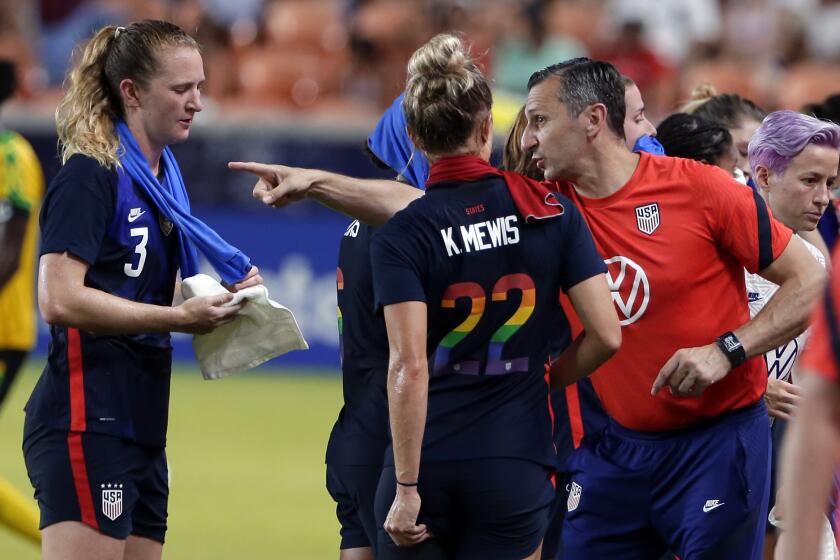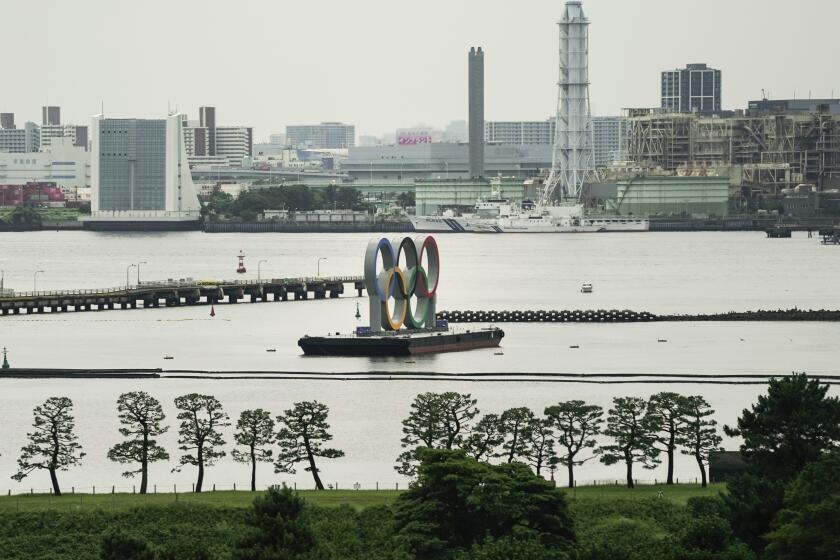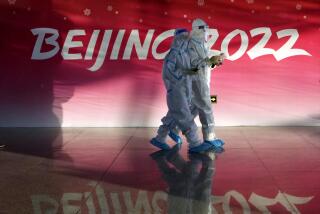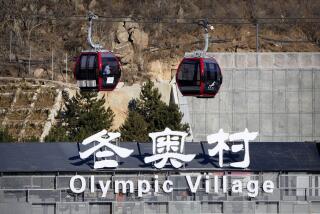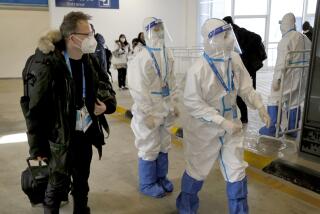How COVID-19 is transforming the Tokyo Olympics even before the Games start
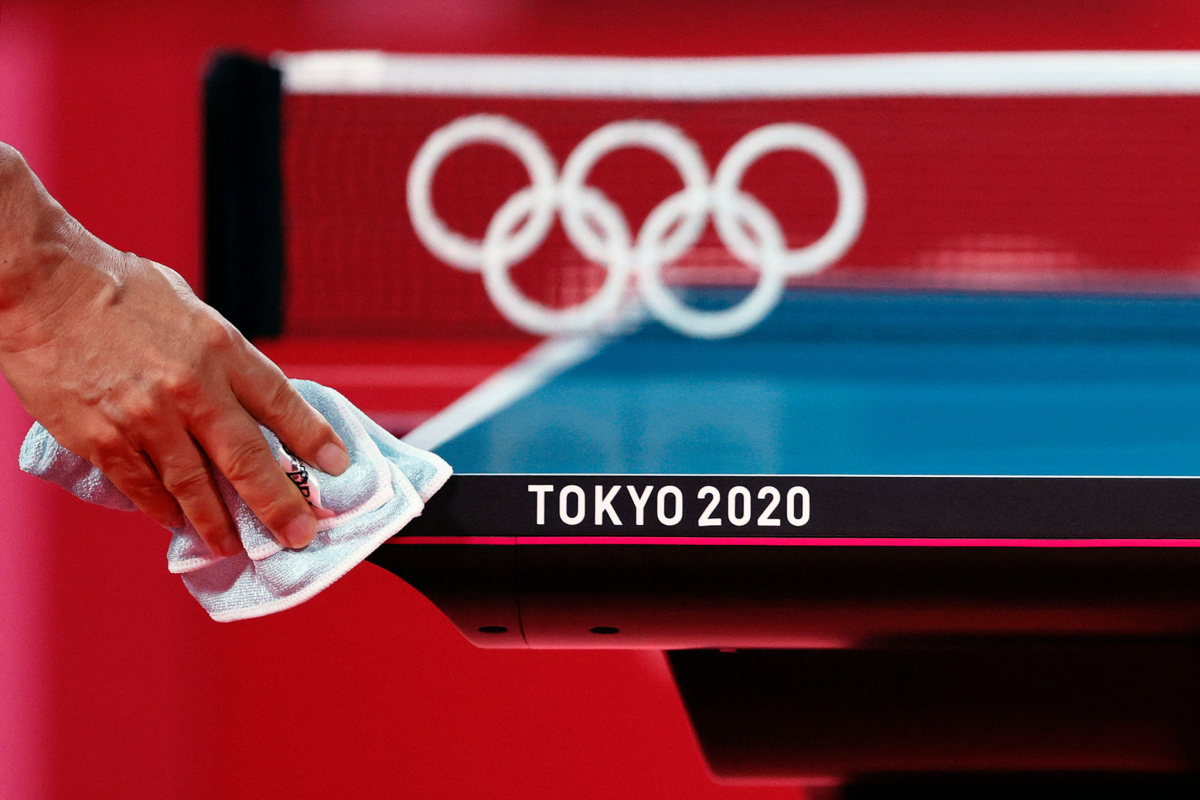
- Share via
TOKYO — With the clock ticking down to the start of the Summer Games on Friday, Olympic executives and Japanese organizers find themselves increasingly on the defensive.
COVID-19 cases continue to run high in this capital city, there have been public protests and each new day seems to bring another positive test — an American gymnast, two South African soccer players — in and around the Games’ purportedly secure bubble.
All of which underlines a lingering question: Why push forward with a massive sporting event in the midst of a global health crisis?
At a news conference over the weekend, the president of the International Olympic Committee acknowledged that debate around the recently dubbed “Pandemic Games” has grown “more heated and more emotional.”
The U.S. women’s soccer team’s No. 1 world ranking means anything less than gold in the Tokyo Olympics is failure for new coach Vlatko Andonovski.
“Many people feel under stress, they have to face uncertainty and then you react with some skepticism and strong arguments,” Thomas Bach told reporters. “I think it is human life.”
If the motivation to persevere seems obvious — think billions of dollars in broadcast rights — the methods are not. On the ground in Tokyo, where the government has implemented a state of emergency, the IOC and organizers are scrambling to avoid a superspreader event.
“We all have to follow the rules,” said Seiko Hashimoto, president of the Tokyo 2020 organizing committee. “That is what we feel is important.”
Everyone arriving here in recent weeks — thousands of athletes, coaches, officials, media — has become accustomed to spitting into plastic tubes for COVID saliva tests.
There is no dining in local restaurants or visiting tourist attractions, with the Olympic community restricted to hotels and official sites. IOC executive director Christophe Dubi insisted that “mingling with the population is extremely limited.”
Athletes have been encouraged to stay away from Tokyo — not counting training camps outside the city — until five days before their first event and depart within 48 hours of finishing competition. That means the traditional athlete parade at Friday evening’s opening ceremony should be considerably smaller.
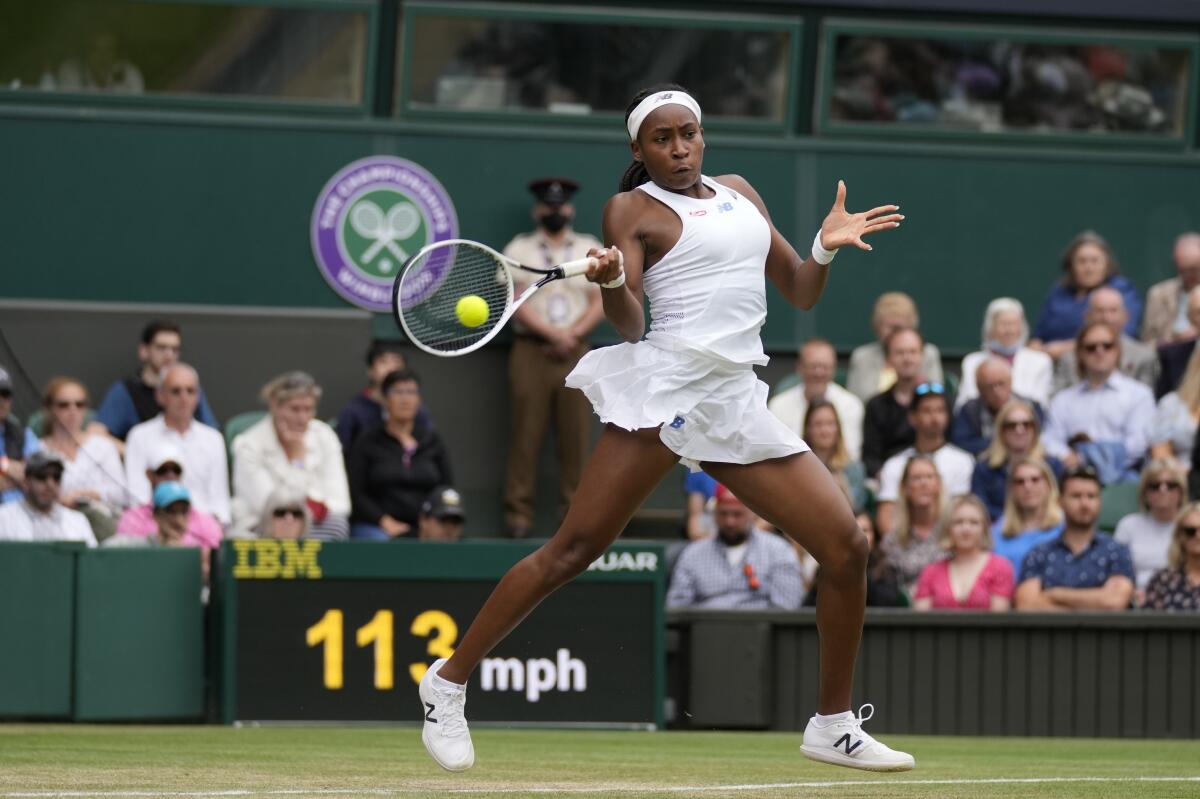
Gatherings and socializing inside the athletes village — a mainstay of the Olympic experience — also will be curtailed.
“The village was designed for a capacity of 17,000 people,” Dubi said. The largest residency will occur around the middle of the 17-day Games, when the schedules for several big sports intersect and “we will have about 6,000 athletes and their entourages.”
Still, international health officials have expressed doubt about whether the Games can be held safely as the Delta variant makes its way around the globe, and Dubi conceded “there is no such thing as zero risk.”
The two South African athletes tested positive inside the village. The U.S. gymnast, Kara Eaker, a team alternate, was elsewhere at a training camp in Japan, working apart from star Simone Biles and others. In all, as of Tuesday 71 people associated with the Games had been infected with COVID-19 as of early this week.
With a week to go until the Tokyo Olympics, COVID-19 cases are once again on the rise in Japan. What went wrong with the once-celebrated “Japan model”?
The head of the New Zealand national team, Rob Waddell, said his athletes “are aware there is risk in this environment; there is risk just by the fact there’s a lot of people in one small area.” He has noticed another issue in Tokyo.
“It was hard driving here today past some of the magnificent venues that have been set up for this Olympic Games because they are spectacular and it would have been amazing to have crowds there, no doubt about it,” he said.
In the weeks since organizers decided to bar spectators, the IOC has worked on several gimmicks to make empty arenas feel less odd to competitors.
The Olympic Broadcasting Services have gathered recordings of cheering and ambient sound from various contests and matches at previous Games. The public-address system at a volleyball match in Tokyo, for instance, will be able to play crowd noise from past matches at low levels to provide atmosphere and minimize echoing across deserted stands.
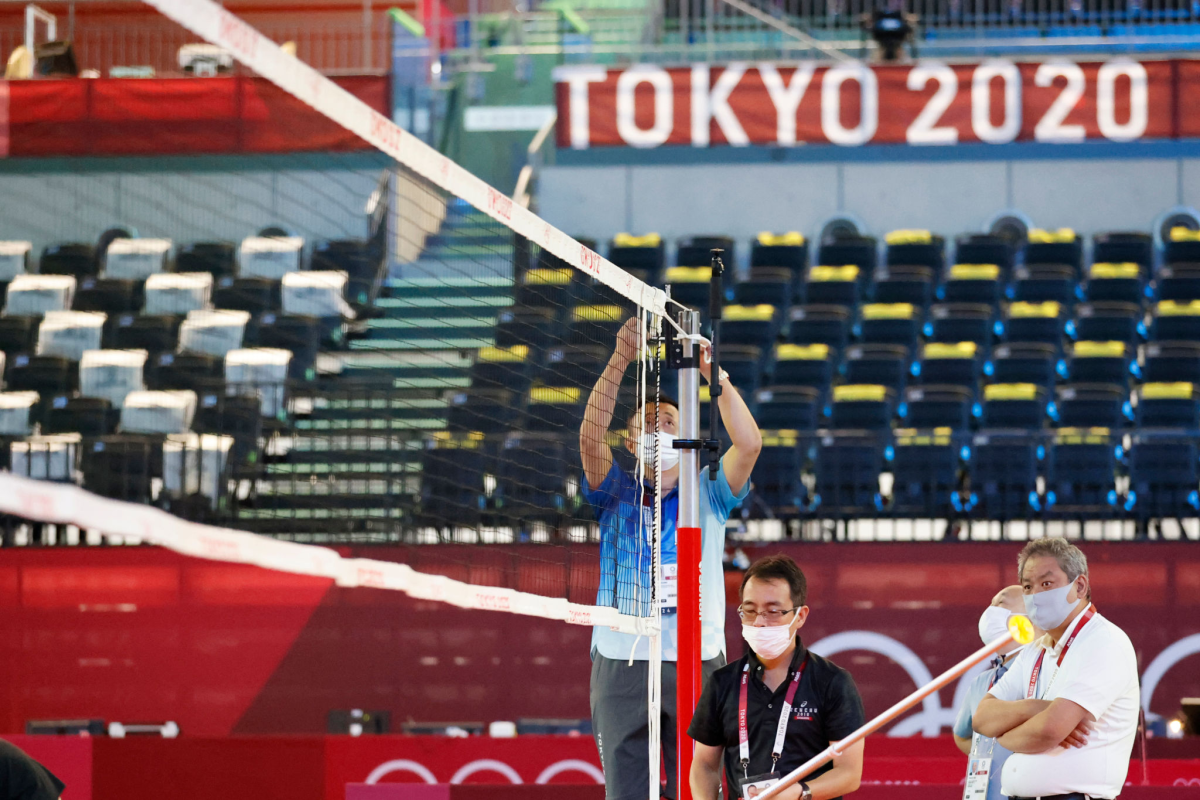
Borrowing a trick from the NBA, organizers will erect large video screens showing a checkerboard of individual fans watching in real time. There will be electronic “cheer maps” of the world with glowing spots where people are following the action. Video monitors in the mixed zone — the area beside the field of play — will allow some medal winners to interact with family and friends immediately after competition.
“We do not want athletes to feel alone in the stadiums,” Bach said. “We want to show them that many people are with them, that they are supporting them.”
Moral support could prove important — in a realm accustomed to constant anti-doping tests, athletes now face the added anxiety of waiting for COVID results.
The IOC has resisted making vaccinations mandatory, instead establishing a layered protocol that begins with those saliva tests. Positive results trigger a more sensitive test of the same sample; another positive prompts a PCR nasal swab. The infected are quarantined at government-run hotels and, with all credential holders loading GPS apps onto their cell phones, close contacts are identified and made to isolate.
For athletes — such as six British team members who came in contact with a COVID case on their flight to Japan — that means living and training alone. There has been skepticism about an IOC policy that would allow them to compete if they test negative within six hours of their event, but officials believe medical literature shows this time window to be safe.
Some competitors won’t get that far; 17-year-old American tennis player Coco Gauff is one of many who tested positive even before leaving their countries.
“I am so disappointed,” she wrote on social media. “It has always been a dream of mine to represent the USA at the Olympics.”
Olympic officials are trying to put a positive spin on growing infections among their ranks, looking for ways to comfort the populace of a nation where more than 15,000 people have died from COVID and, by various estimates, only about 20% have been vaccinated. They point out that only 0.1% of people arriving from outside the country have tested positive.
“What we are seeing is what we expected to see,” said Brian McCloskey, head of an expert panel assembled by the IOC. “The numbers we are seeing are actually extremely low; lower than we expected.”
When asked how many cases the IOC expected by Games’ end, McCloskey appeared to backtrack, saying: “We don’t put a figure on it. It is impossible to predict.”
Bach, who was heckled from afar during a recent appearance in Hiroshima, expressed confidence that the Japanese will be more enthusiastic once competition begins. Local organizers sounded less sure.
“Gradually the citizens are understanding this is going to be safe and secure, and gradually the approval rating is getting higher,” Hashimoto said.
Still, with the opening ceremony just days away, he added that “the Games are not really fully embraced by the public.”
More to Read
Go beyond the scoreboard
Get the latest on L.A.'s teams in the daily Sports Report newsletter.
You may occasionally receive promotional content from the Los Angeles Times.

